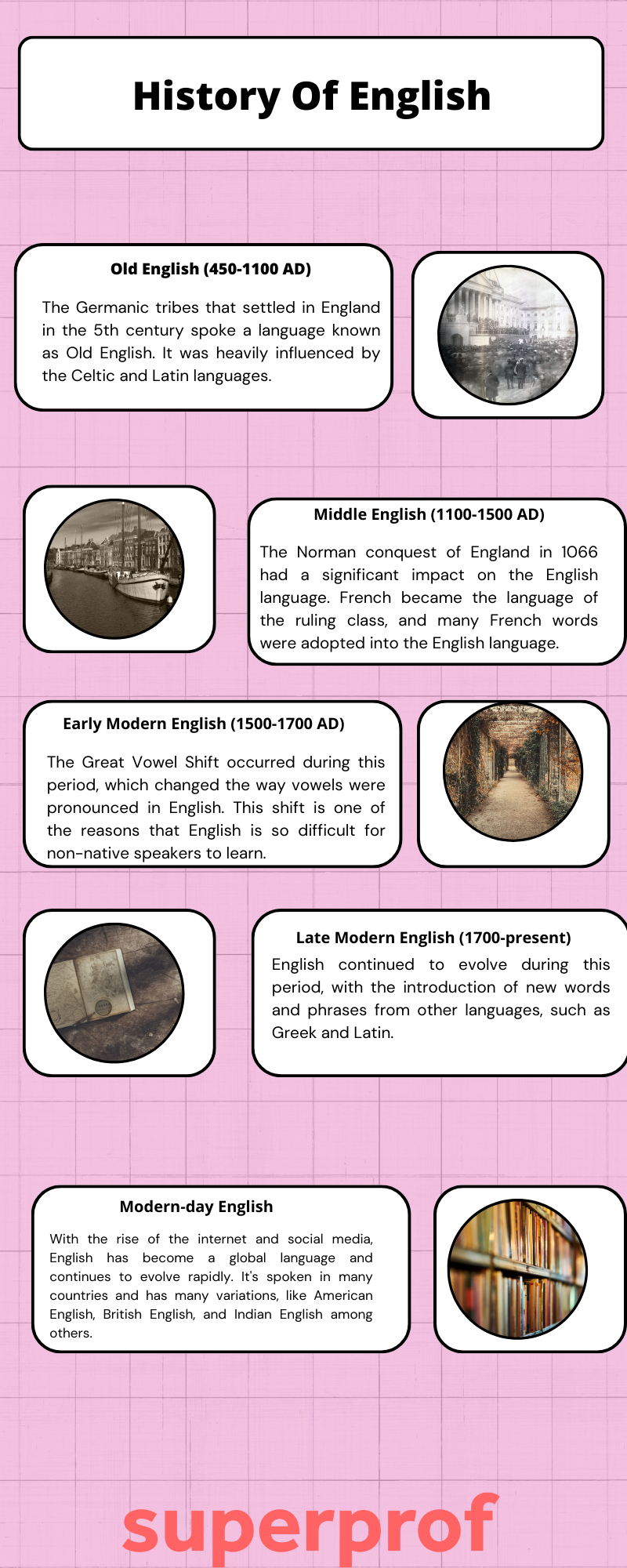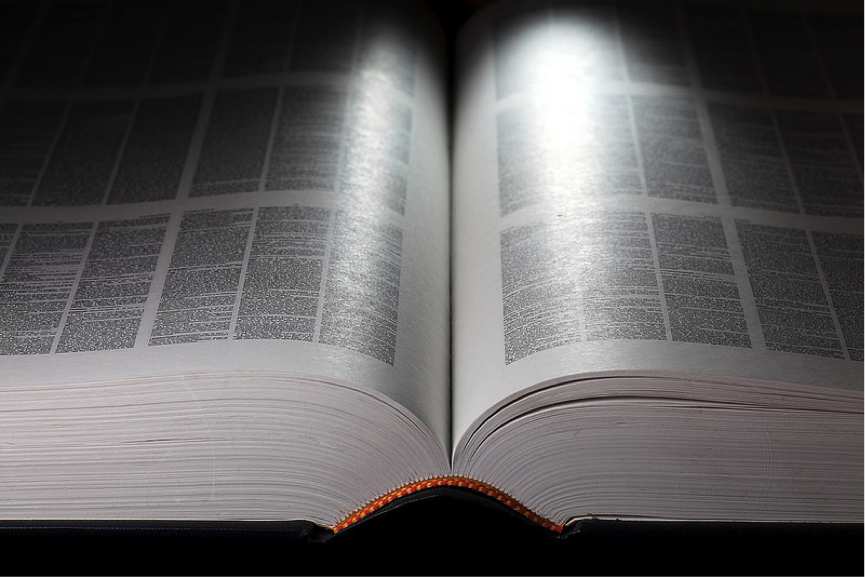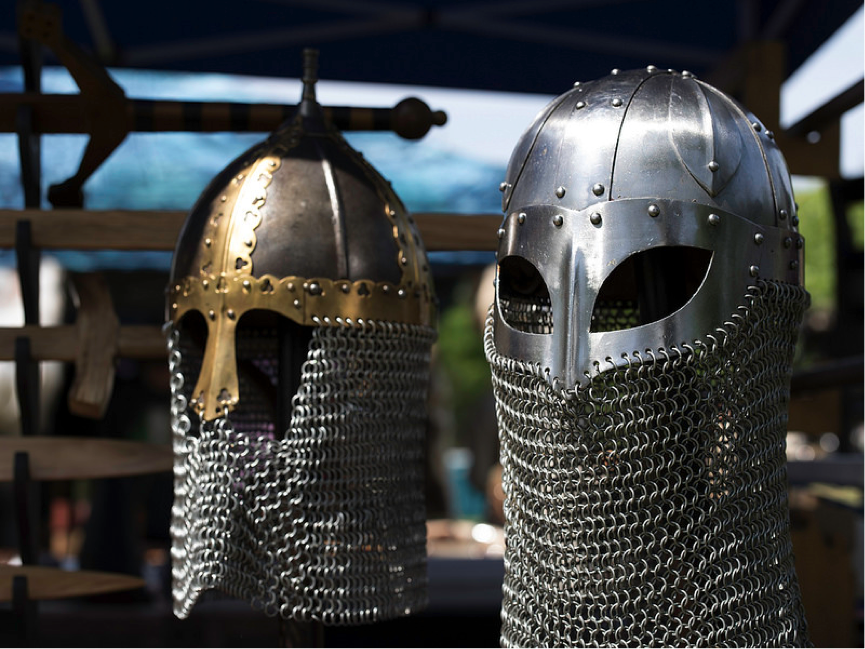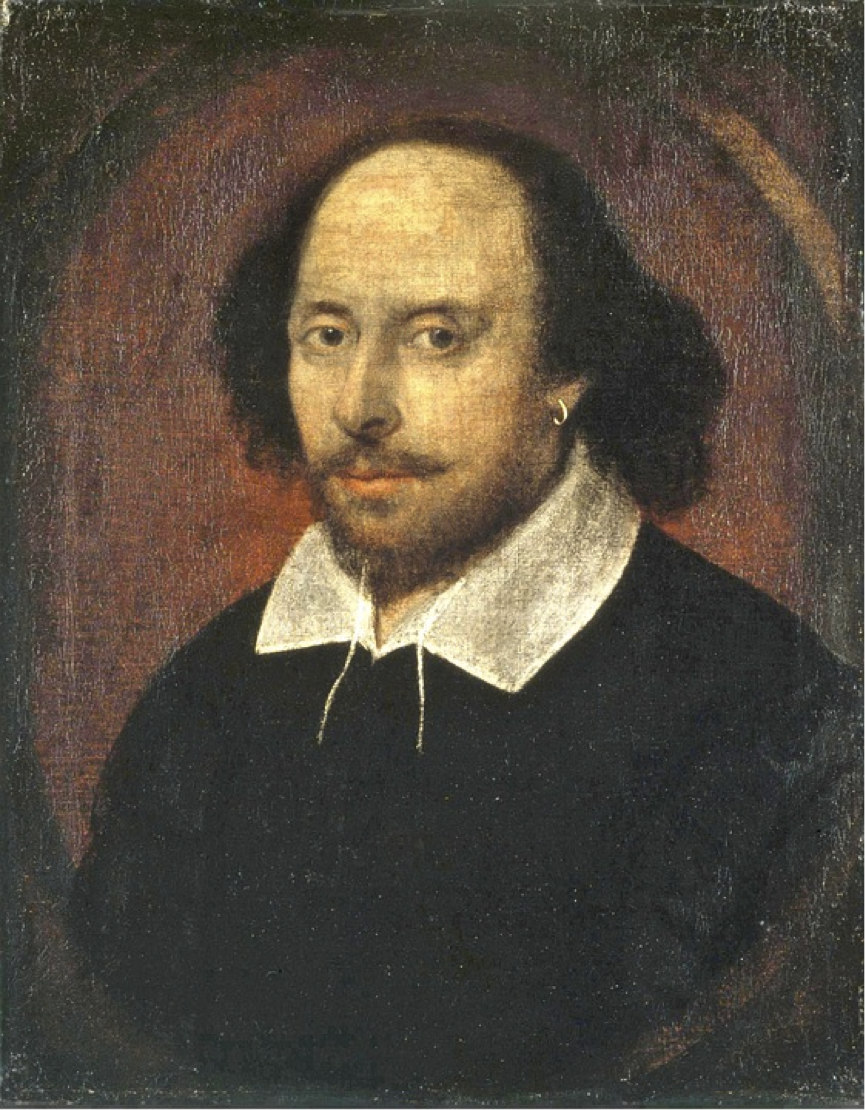According to Ethnologue, a database of world languages, approximately 379 million people speak English as their first language. However, it's important to note that English is also a widely spoken second language, with an estimated 1.5 billion speakers worldwide.
English is the first taught language worldwide, it is an official language in 53 countries, for almost 1.5 billion people. Although, as their mother tongue, more people speak Chinese, English is close behind.
Nowadays, more and more people wish to learn English for job-related reasons, in particular in the digital sector.
The English language has been around since approximately 700AD. The evolution of the English language occurred in 3 stages: Old English was influenced by Germanic tribes, Middle English developed with more French influence after 1066AD, and Modern English developed from around 1500AD into the modern language that we all know today.
This is a summary of the rich history of the English language, which has been shaped by many factors over many centuries.

Brief Chronology of English

Old English: A History of The English Language
Before 700AD, the Germanic tribes were in a perpetual battle for territory. They arrived in Great Britain, which was called Britannia at the time and ejected the Celtic tribes, even forcing some of them to flee to mainland Europe in Armorica (nowadays known as Brittany, in France).
The Germanic tribes spoke languages like Old Norse, Frankish, Frisian, Saxon, Anglian; all languages, which we can compare with Germanic dialects and the early stages of the English language that did not yet exist.
The origin of Old English is in direct link with migration flows of the Germanic tribes, towards the British islands: the Angles, the Saxons, the Jutes and the Frisians. The Angles coined the terms “England” and “English”.
The Germanic dialects mutated Old English from 700 to 1100AD. It was first written in the runic alphabet and then in Latin. The linguistics was formal: from a phonetic point of view, it was very close to the Old Frisian language, to the point where some linguists spoke Anglo-Frisian. It was also considered boring and left fundamental words behind, such as “him”, “he” and their derivatives.
The evolution of the Early English language is closely linked to the story of invasions in Great Britain, from the 8th and 9th centuries, notably the Vikings who spoke Old Norse (or Old Irish). This dialect found certain words, which are still used nowadays, such as “take, give, and skin”. The Old Irish language left its mark in English by influencing fundamental grammatical rules, such as “they, them, and their” and “-s” of the third person (singular).
Find out how to learn English with our Great Selection of Anglophile News Outlets.

Middle English
The English language evolved from the 11th century, following the Norman Conquest, at the Battle of Hastings in 1066 and the growth of the catholic church.
Middle English was a mixture of Latin languages, such as Norman French and Germanic languages, like Old Scandinavian, in regards to syntax and word order, in particular, the placing of the verb in a sentence. We can compare the structures of English phrases to Danish and Irish, which come from Germanic origins.
We must go back to William the Conqueror’s victory to understand the integration of Latin languages. Following his victory in 1066 and his coronation as King at the Abbey of Westminster, William the 1st of England settled down in Great Britain. Norman was the language spoken in what is today North East France, whereas the South of France spoke the Occitan language. French diplomats of the time were obligated to take English classes with an English teacher.
The Norman language led to serious linguistic changes in English, as it became the language of the Courts. It introduced a lot of diversity in the Middle English vocabulary.
In many cases there were 2 words used to refer to the same item. There would have been a Saxon word, originally from Germanic and a word originally from Norman. The Saxon term was used by the people, whereas the Norman term was used by the nobility, for example, “pig” vs “pork” and “ox” vs “beef”.
Many words have been taken from the Norman language, such as “authority", "government", "pardon", "battle", "cream", "vinegar", "anatomy", "nature", "table", and "honour”.
Nowadays, non-native English speakers often find it difficult to pronounce the famous “th” sound during English classes. However, it was the Norman scribes who introduced this diagram (the joining of 2 letters, like “ch, sh and gh”, as well as the letter “w”) into English.
Get information about English speaking classes on Superprof, and learn how to improve your English with a passionate teacher.
The One Hundred Years War (1337-1453) marked a turning point in the English language. This war between France and Britain triggered a need for a separate English identity, which influenced the language.
At the outbreak of war, all nobility spoke French and were very closely connected with the continent, many with titles and land in both. French was the language of the monarchy and the aristocrats, at the expense of English, which was spoken by the common people.
But in 1362, the English Parliament recognized English as the official language of the courts. King Henry IV of England who reigned at the time used French as his mother tongue and English as his second language, however, subsequent generations began to write official documents in English.
Influence of French on English
The impact of French on the English language primarily relates to its vocabulary, spelling, and to some extent, pronunciation. The majority of French words in English were adopted after the Norman Conquest in 1066, when Old French, particularly the Old Norman dialect, became the language of the new Anglo-Norman court, the government, and the upper class. This period lasted for many centuries during the Hundred Years' War (1337–1453). Nevertheless, French has continued to influence English. Estimates of the percentage of English vocabulary derived from French vary from one-third to two-thirds.
In the years after the Norman conquest, English writing was primarily done by Norman scribes.
As a result, French spelling rules had a significant impact on the development of English spelling. Some of the changes that occurred during this time include:
- Using "qu-" instead of "cw-" (e.g. queen)
- Using "gh" instead of "h" (e.g. night)
- Using "ch" or "cch" instead of "c" (e.g. church)
- Using "ou" instead of "u" (e.g. house)
- Using "sh" or "sch" instead of "sc" (e.g. ship)
- Using "dg" instead of "cg" or "gg" (e.g. bridge)
- Using "o" instead of "u" (e.g. love, son)
- Doubling vowels to represent long vowel sounds (e.g. see)
- Doubling consonants after short vowels (e.g. sitting)
- Increased use of "k", "z", and "j"
Some letters that were originally from Germanic runes or Irish script and were common in Old English, such as ? and ð, fell out of use, possibly because the Normans were not familiar with them. The letter þ, which was the last remaining runic letter in English, survived in a significantly changed form until the 17th century.
Modern English

From the 16th century onwards, Modern English began to develop and it is still evolving today. We seperate Modern English into two periods: Early Modern English, marked by the Renaissance from 1500-1750 and Late Modern English from the 19th century and the 20th century. Nowadays, we talk of Contemporary English, Basic English, and Business English.
Early Modern English marks the structure of spelling and grammar, which allows us to understand texts written by William Shakespeare. It is marked by the increasing presence of vowels.
English continues to evolve with the influence of Latin and Greek. English authors write literary texts, whereas scientific research (medicine and certain law texts) are written in Latin. This is why that words, such as, “maternity, atmosphere or skeleton” have been borrowed from Latin. Greek has equally left its mark with words, such as, “anthropology, archaeology, and geography”.
During the Renaissance, the perception of the Latin language was superior to some words, which originated from Anglo-Saxon and Germanic. The growth and importance of other European countries, such as Italy during the Renaissance left it's mark with words such as “opera, carnival, and tarot”. Spanish has not been left behind either as Elisabeth I spoke this language.
The age of European exploration and continued colonialism thereafter was marked by significant trade and travel. English began borrowing words from a variety of languages around the world:
- Dutch words such as, “yacht or wagon”
- Arabic words such as, “admiral, alembic, cotton, elixir, alcohol, algebra, and apricot”
- Hindi words such as, “curry” or “arsenic”
- Persian words such as, “bazaar” and
- Turkish words like “coffee and caviar”
- Native American words such as, “canoe, lama, manioc, tobacco, and chocolate”

Old English, also known as Anglo-Saxon, was spoken between the 5th and 11th centuries. Middle English was spoken from the 11th to the late 15th century. Early Modern English was spoken from the late 15th to the late 17th century. Modern English is the form of the English language spoken since the late 17th century. Here are some examples of how vowel sounds have changed over time:
- The Old English "??" sound evolved into "??" in Middle English, then into "o?" in Early Modern English, and finally into "o?" in Modern English.
- The Old English "æ?, æ??" sound evolved into "??" in Middle English, then into "e?" in Early Modern English, and finally into "i?" in Modern English.
- The Old English "e?, e?o" sound evolved into "e?" in Middle English, then into "i?" in Early Modern English, and finally into "ee, -e" in Modern English.
And so on for the other vowel sounds. This shows how the pronunciation of vowels has changed over time in the English language.
Over the 18th and 19th centuries, Late Modern English was marked by the growing contribution of Latin. Why? Well, more technical and scientific vocabulary was used during this industrial period and technical advances, such as “album, minimum, status, stimulus, insomnia, maximum, ultimatum, detritus, duplex, and sanatorium”.
The extension of English was marked by colonization and the growth of the British Empire. The English language extended into Ireland, where half the population at the end of the 18th century still spoke Irish. Nowadays, 98% of Irish people use English as their mother tongue.
In North America (Canada and the United States), English witnessed real expansion throughout colonisation. British English evolved into American English, with different pronunciations and different lexicon. We can witness these differences in Anglophone media, film and literature.
The colonization of South Africa and Australia led to the introduction of English, by convicts who borrowed a few words from the aboriginal language, such as “boomerang, kangaroo, and wombat”.
And English is the language most spoken worldwide! Discover the weird and wonderful world of British cuisine.
Interesting Facts About The History Of The English Language
Here are a few interesting facts about the history of the English language:
- English is a Germanic language, which means it evolved from a group of languages spoken by the Germanic tribes that settled in England during the 5th and 6th centuries.
- The English language as we know it today has been heavily influenced by other languages, including Latin, French, and Scandinavian languages.
- Old English, which was spoken in England between the 5th and 12th centuries, is quite different from modern English. For example, it had complex grammatical inflections, and some words that were common in Old English are no longer used today.
- The Norman conquest of England in 1066 had a significant impact on the English language. French became the language of the ruling class, and many French words were adopted into the English language.
- The Great Vowel Shift, which occurred in the 14th, 15th, and 16th centuries, changed the way the vowels in English were pronounced. This shift is one of the reasons that English is so difficult for non-native speakers to learn.
- William Shakespeare was a major influence on the English language. He introduced many new words and phrases, many of which are still used today.
- English has also been influenced by many other languages and cultures, as it was taken as a language of trade and colonization and it's currently spoken all over the world.
- The English language has been shaped by technological advancements, the internet and social media have had a significant impact on the way we use and understand the English language.
In 1940, Churchill desired the creation of Basic English, with 580 words, to make English the most unique language worldwide.
Moreover, Churchill inspired many famous English quotations, for example,
“You have enemies? Good. That means you've stood up for something, sometime in your life”.
Nowadays and since the start of the 20th century, we speak Contemporary English with a lexical field of nearly one million words.
Its international influence is such that English has become both the reference language for business and culture.















Hello Jon I am from Nigeria and I would love to share some knowledge with you based on some subjects you listed. Thank you
You can teach through Superprof Nigeria. Connect with the team at hello@superprof.com
Main bhi English sikhna sahta ho .khaskar talking English.
Aap Superprof pe english teacher se english seekh sakte hai :)